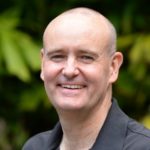If you’re a new business owner just starting out, focusing on the seemingly overwhelming day-to-day challenges that confront you early on is easy. Why focus on the future when there are so many problems right now? In reality, though, starting your business with the end in mind benefits you today and when you’re ready to sell or retire. Just take it from MindShift.money Certified Coach Mick Aspinall.
From The Cockpit To The Office
 A career as an Australian Air force pilot, and then as a 747 pilot for a major airline, taught Mick plenty of life lessons about teamwork, communication, decision making and planning. And all these are lessons that translate to life outside the cockpit. While he still works as a commercial pilot, he’s started his own business teaching small business owners generate high performance in their companies.
A career as an Australian Air force pilot, and then as a 747 pilot for a major airline, taught Mick plenty of life lessons about teamwork, communication, decision making and planning. And all these are lessons that translate to life outside the cockpit. While he still works as a commercial pilot, he’s started his own business teaching small business owners generate high performance in their companies.
He likens starting a business to planning a flight. When flying he says, if a pilot doesn’t plan the destination, they’ll quickly get lost, confused and distracted during the flight. A business is no different. If a business owner doesn’t plan the end goal they want to achieve, things go haywire pretty quickly.
When Mick started Factor Performance, he says he walked the talk. He first answered strategic questions, like why his company existed, what kind of culture he wanted and the goals he wanted to achieve. Those strategic decisions determined the tactical decisions he would make down the road, the “how” he would accomplish those goals.
Planning ahead gave a touchstone to go back to so no matter how much his business grows, the core is always the same.
“When we come back to the core of why I’m doing it and what I’m trying to achieve,” Mick says, “That touchstone that I was able to identify very early on has been great.”
The Missing Piece
One critical piece he says he was missing early on, however, was what he wanted the business to achieve for him personally. That was all about determining what type of business he had: a Legacy Business or a Profit Business.
Originally, Mick thought he was building a Legacy Business, but as he drilled down into the business types taught in Cash Flow Cure, he realized that, while his business did have a few characteristics of a Legacy Business, it was really a Profit Business. The determining question for Mick was “who will buy it when I retire?”
Because his business revolves so much around his personal experience and knowledge base, he couldn’t really sell his business. And that meant he didn’t have a Legacy Business.
Determining his business type helped him see his most valuable resource, which in turn helped him optimize that resource. For Mick, time is more critical than almost anything else he has, so he can now make decisions that steward his time well, including deciding what team members to hire.
“The fact that I’m building a profit business,” Mick says, “Means I’ve got some clarity around, ‘Okay, well these are the team members that I need hire to help me because I’m building a profit business.’ If I had been building a legacy business, I might go about that in a different way because it’s not time I’m trying to optimize, it would be leverage, essentially, that I’d be trying to create if I was building a legacy business.”
Mick Aspinall’s End Game
When it comes to owning and running a business, it’s all about the long game and big picture thinking. For Mick, starting his business with the end in mind helps him make better decisions about how to use his resources.
Finding the time to plan for the future may be tough in the middle of all your other responsibilities, but it the dividends are huge.
image credit: Bigstock/khunaspix
Erin is the managing editor of MindShift.money and the owner of Lane Change Media. As a business owner and content provider, she takes her personal motto, “Don’t slow down, just change lanes” seriously. She lives in Los Angeles and has far too many pets.
